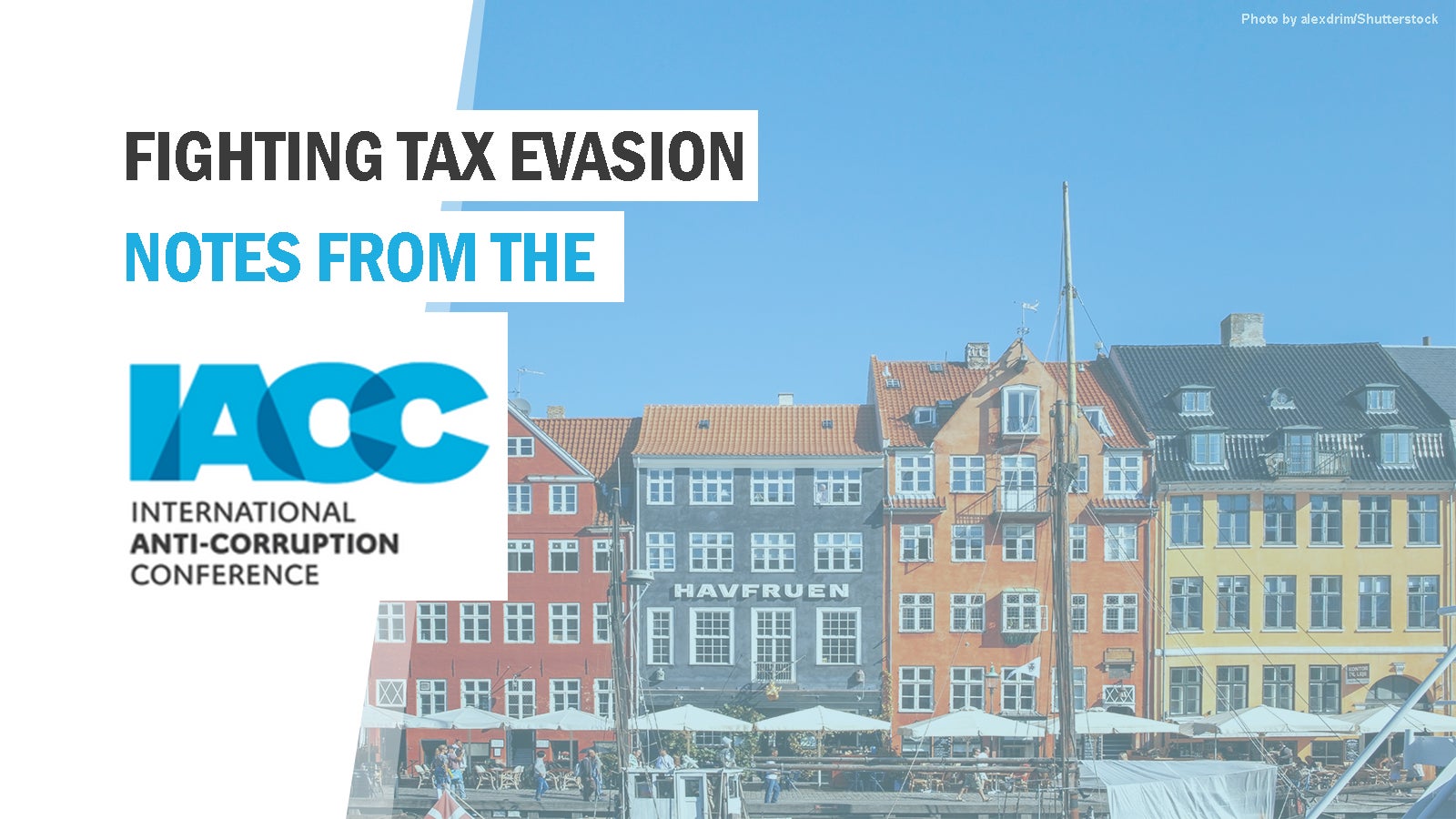
The irony was hard to miss.
Last month, leaders from the public and private sectors, civil society, international organizations, academia, and the media met at the International Anti-Corruption Conference (IACC) in Copenhagen.
At this year’s conference, news broke that a network of banks, lawyers, and stock traders had engaged in a criminal form of tax evasion called CumEx. The price to European taxpayers: about EUR 55 billion. Denmark, the host of the IACC, was the hardest hit, suffering some EUR 2 billion in losses.
Thanks to a tip from another country, the Danes were able to stop the financial hemorrhage. They subsequently alerted the Norwegians, who were able to take preventive measures, losing “only” some thousands of Euros. The example shows the importance of interagency cooperation and the need for developing countries to be more aware of advanced tax fraud activities that may subsequently occur in their countries.
The value of interagency cooperation
In this context, the World Bank/OECD report Improving Co-operation between Tax Authorities and Anti-Corruption Authorities in Combating Tax Crime and Corruption was launched during the IACC. Moderated by the World Bank and the OECD, it formed the basis for a session with representatives of the governments of France, Ghana, and Kenya.
The report shows that more effective cooperation is needed between tax and corruption investigators. For example, only 55 percent of the developed and developing countries we surveyed require their corruption investigators to report suspected tax crimes. When it comes to information-sharing, even fewer countries mandate it—just 44 percent. The report also provides practical examples for how to overcome barriers to interagency cooperation.
Still, some countries are making good progress in fighting tax evasion and other fraudulent activities. A few years ago, for example, Kenya established a Multi-Agency Task Team (MATT) comprising all of the country’s enforcement agencies. The MATT reports directly to the president and has access to a central pool of funds. Its work has resulted in several convictions. This type of coordination is lacking in many developing countries—and even in some of the wealthiest OECD members.

Corruption leads to tax evasion
The IACC concluded with a Joint Statement signed by 18 nations (Afghanistan, Argentina, Australia, Burkina Faso, Denmark, Finland, France, Ghana, Indonesia, Ireland, Kenya, Norway, South Korea, Sweden, Tunisia, Ukraine, the U.K., and the U.S.); several international organizations, including the World Bank Group; and businesses.
As noted in this excerpt, the Joint Statement explicitly recognizes the importance of fighting tax evasion: “Tax evasion undermines domestic resource mobilisation and sustainable development and disadvantages the law-abiding. We support decisive action against tax evasion and actions to explore coordination between anti-corruption and tax enforcement activities.”
This call to action is important. There are many types of financial crimes crippling developing countries, so why should we focus only on corruption? By recognizing financial crime more broadly, we expand the tools we have available. To me, it makes a lot of sense.
Practical takeaways
In collaboration with the East African Community, the Netherlands’s Fiscal Information and Investigation Service, the U.S. Internal Revenue Service (IRS), and the Danish Tax Agency (DTA), the World Bank is also crafting a program to help developing countries fight tax evasion—an “International Fusion Center” that will be launched sometime next year. The idea is to leverage developed countries’ IT savvy, knowledge, and business smarts in support of the World Bank’s lending and technical-assistance work.
It’s invigorating to learn about progress made around the world. While I couldn’t attend every session at the IACC, I can offer a few practical takeaways:
- Assess the threat of insurance products: The nature of tax evasion is changing, from the use of shell companies in secrecy jurisdictions to the purchase of insurance products that can be turned into cash quickly (in essence creating a tax haven in any country).
- Exchange information on customs: In his intervention, Ghana’s deputy minister of finance, Kwaku Kwarteng, said that governments should exchange information on customs. This would enable countries such as Ghana, which relies heavily on customs duties (40 percent of domestic revenue), to compare declared export value with declared import value to spot mis invoicing.
- Be aware of discussions about bringing tax evaders before the European Court of Human Rights: In the corridors of the IACC, some members of the human-rights community discussed options for taking legal action against banks that engage in tax evasion. For those interested in the nexus between human rights and corruption, the Wallenberg Institute for Human Rights and Humanitarian Law just published a report on the topic.
- Draw on the resources of tax-investigation bodies: The Uganda Revenue Authority, for example, is helping more and more agencies by furnishing them with information about beneficial ownership and forensic lab services.
- Detect red flags in the extractive sector: The National Resource Governance Institute, headed by my former World Bank colleague Daniel Kaufmann, presented its report on corruption in the extractive sector. Identifying 12 “red flags” in over 100 cases from 49 resource-rich countries, it’s a must-read for anyone who works in the sector.
- Use artificial intelligence (AI) to identify tax fraud: AI tools in Denmark, for instance, have shown an 85 percent hit rate, with 65 percent involving fraud.


Join the Conversation